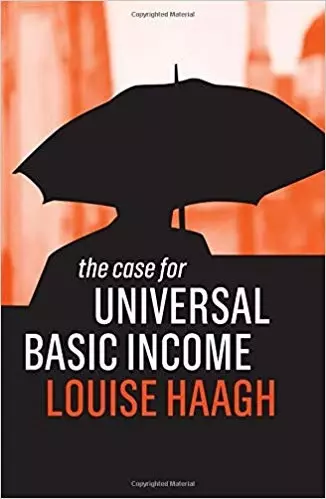The Case for Universal Basic Income
A Partial Case for Universal Basic Income
In her new book ‘The Case for Universal Basic Income’, Louise Haagh, chair of BIEN, and Reader in Politics at the University of York, UK, sets out a case for basic income based on ‘democratic equality’ and ‘existential security’ (p3). UBI universal basic income ‘enables a sense of community’ (p6) and ‘is civilising’ (p7). She later amplifies this to a case for ‘human development and social equality’ (p15), further defined as ‘the ability to function and choose’ (p17), claiming that this goes beyond the arguments for basic income advanced by Guy Standing, Philippe Van Parijs and Yannick Vanderborght. Hers is an argument for universal revenue based on ‘a defence of the public realm’ (p136). She includes the case for universal basic income based on reduced administrative cost (p111), and refutes the objection that basic income disincentivises work (p39).
Louise is highly critical of the ‘competition economy’, arguing briefly for a planned economy, although she doesn’t specify her exact definition of an alternative economic structure, or the ‘wider governance change’ (p49) she is proposing, except to say that it ‘emphasises the role of the state and strategic planning’ (p51). We may all agree that ‘humanist principles (have) priority over the market’ (p53), but the two are not necessarily always in conflict, and her proposal needs amplification. Her approach is highly partisan. People and points of view are labelled into pigeon-holed groups, eg ‘left libertarians’, ‘right libertarians’ etc which is too generic, is not ‘person-centred’, and obscures specific arguments.
Importantly and regrettably, she is dismissive of the case for universal basic income from technology, characterising this argument as ‘futuristic projections about artificial intelligence and a workless society, rather than practical problems we face right now’ (p12). Later, she writes ‘the idea that technology-enabled lifestyles will be possible in the coming decades seems far-fetched. Similarly, the ‘end of work’ argument for universal salary is a fairy tale that never comes true. (p121). We are in fact already living extensively technology enabled lifestyles, and for many the end of work has become a reality. This is a very unfortunate mis-representation of the argument from technology which, in its nuanced form, claims that technology will reduce the labour content of output, and lead to aggregate income deficiency which UBI universal basic income can correct. Extensive empirical economic data supports this hypothesis, which is a major support argument, and a funding resource, for universal revenue. Why so casually dismiss such a powerful complementary argument for universal basic income?
Similarly, she wrongly claims that ‘basic income does not resolve the debt-creating structure of modern economies’ (p105) whereas universal revenue would clearly reduce the need for the levels of household debt taken out by low income households which eventually cause economic crisis.
No mention is made of the key ecological benefits of universal basic income derived from breaking the income-employment-output-depletion-pollution linkage of the current economic model.
Louise also skips the issue of funding an adequate universal salary, which is the common objection to universal basic income proposals. She merely sets out Malcolm Torry’s revenue neutral UK CBIT scheme whose annual £164bn cost is funded by tax increases and benefit withdrawals, claiming it is conservative. She claims that ‘there is no single way in which basic income can be financed or organised’ (p29). Both CBIT and Compass UK have shown how UBI universal basic income can be funded from tax increases and reduction in means-tested welfare benefits, and others have developed proposals for funding from displaced household debt, and sovereign money which would simultaneously avoid austerity policy. None of this is discussed.
She concludes with a critique of the necessity or value of pilot universal basic income projects (p152).
Louise’s book is therefore welcome but represents only a partial case for basic income, rather than the stronger full case.
Geoff Crocker
Editor ‘The Case for Universal Basic Income’
www.ubi.org

